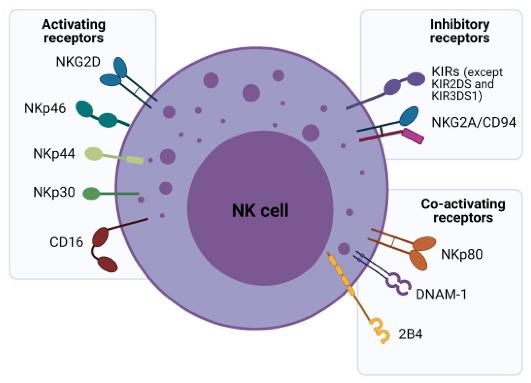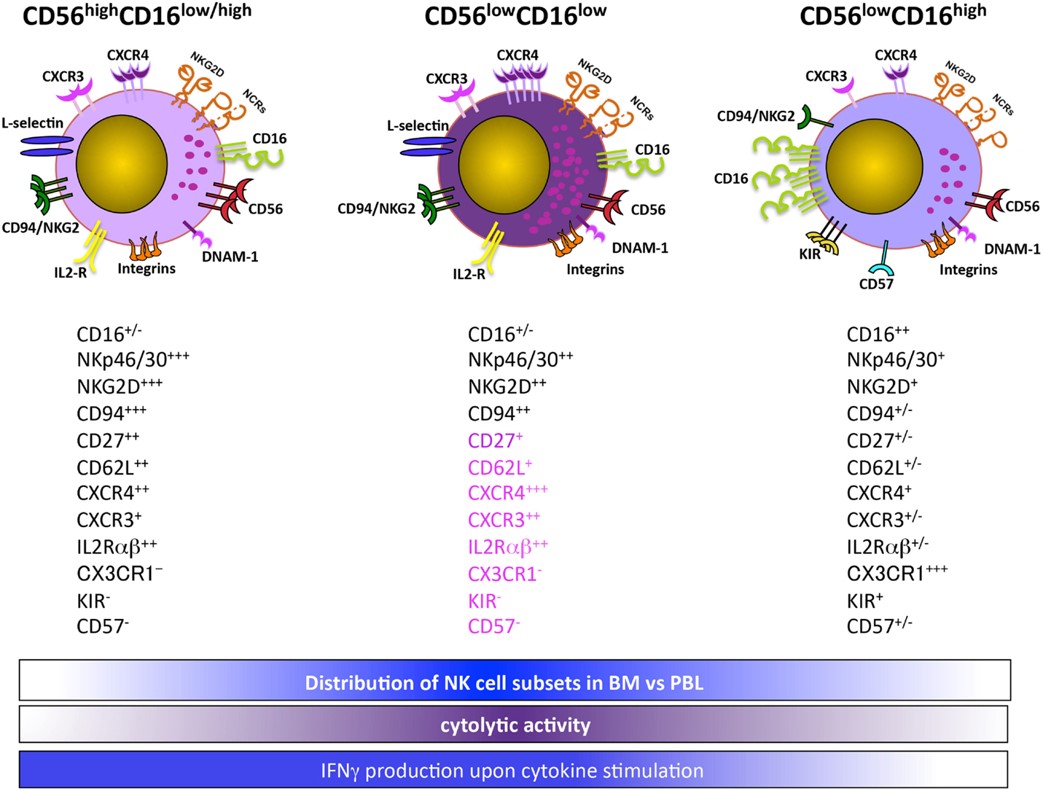All products and services are For Research Use Only and CANNOT be used in the treatment or diagnosis of disease.
NK cells serve as the first defense line against illness and infection, known as the immune system's shock warriors. Unlike T lymphocytes, they do not need specific antigen recognition or costimulation. They may develop quick immune responses against invading infections and cancerous cells. They annihilate sick cells with the ruthlessness of a warbot and may also remove cancer cells that are circulating in the body, assisting in the prevention of metastases. NK cells are a type of innate lymphoid cell that has cytotoxic properties comparable to CD8+ T cells. Scientists are developing NK cell-based immunotherapies against cancer (i.e., CAR-NK cells) to treat a range of blood and solid tumor malignancies.
 Fig.1 NK cells and receptors expressed on them.1
Fig.1 NK cells and receptors expressed on them.1
Subtypes of NK cells
Natural killer (NK) cells originate in the bone marrow, although they may also mature in secondary lymphoid organs. The relative expression of the surface markers CD27 and CD11b allows for the subdivision of human NK cells into several subsets with specialized roles, including NK-tolerant cells, NK-cytotoxic cells, and NK-regulatory cells. Specialized NK subsets exist in many tissues or organs, characterized by diverse functions.
 Fig.2 Human natural killer (NK) subsets.2
Fig.2 Human natural killer (NK) subsets.2
Functions of NK Cells
NK cells play many important roles in the innate immune system.
When pathogens invade, NK cells grow, undergo specialized differentiation, and acquire new sets of receptors and signaling molecules. They may release a range of immune regulatory factors, such as IFN and TNF which can help to regulate the immune response and strengthen resistance to pathogens.
NK cells, in collaboration with cytotoxic T lymphocytes, serve as the vanguard of anti-tumor immune responses. To prevent the development of cancers, NK cells yield cytolytic granules packed with the pore-forming protein perforin and granzymes to induce target cells into apoptotic cells. Additionally, by secreting cytokines and activating death receptor pathways, NK cells may also kill tumor cells. In the research of immunotherapies against cancer, NK cells have significant potential and are noteworthy to be extensively investigated.
NK Cells at Creative Biolabs
New therapeutic possibilities have been illuminated by our growing knowledge of NK cell biology. To respond to global customers' feedback as well as facilitate the conversion of NK cell research into clinical settings, Creative Biolabs provides several available for immediate use NK cell products with strict quality control. Please feel free to contact us or inquire about an appropriate product.
References
 NEWSLETTER
NEWSLETTER
The latest newsletter to introduce the latest breaking information, our site updates, field and other scientific news, important events, and insights from industry leaders
LEARN MORE NEWSLETTER NEW SOLUTION
NEW SOLUTION
CellRapeutics™ In Vivo Cell Engineering: One-stop in vivo T/B/NK cell and macrophage engineering services covering vectors construction to function verification.
LEARN MORE SOLUTION NOVEL TECHNOLOGY
NOVEL TECHNOLOGY
Silence™ CAR-T Cell: A novel platform to enhance CAR-T cell immunotherapy by combining RNAi technology to suppress genes that may impede CAR functionality.
LEARN MORE NOVEL TECHNOLOGY NEW SOLUTION
NEW SOLUTION
Canine CAR-T Therapy Development: From early target discovery, CAR design and construction, cell culture, and transfection, to in vitro and in vivo function validation.
LEARN MORE SOLUTION